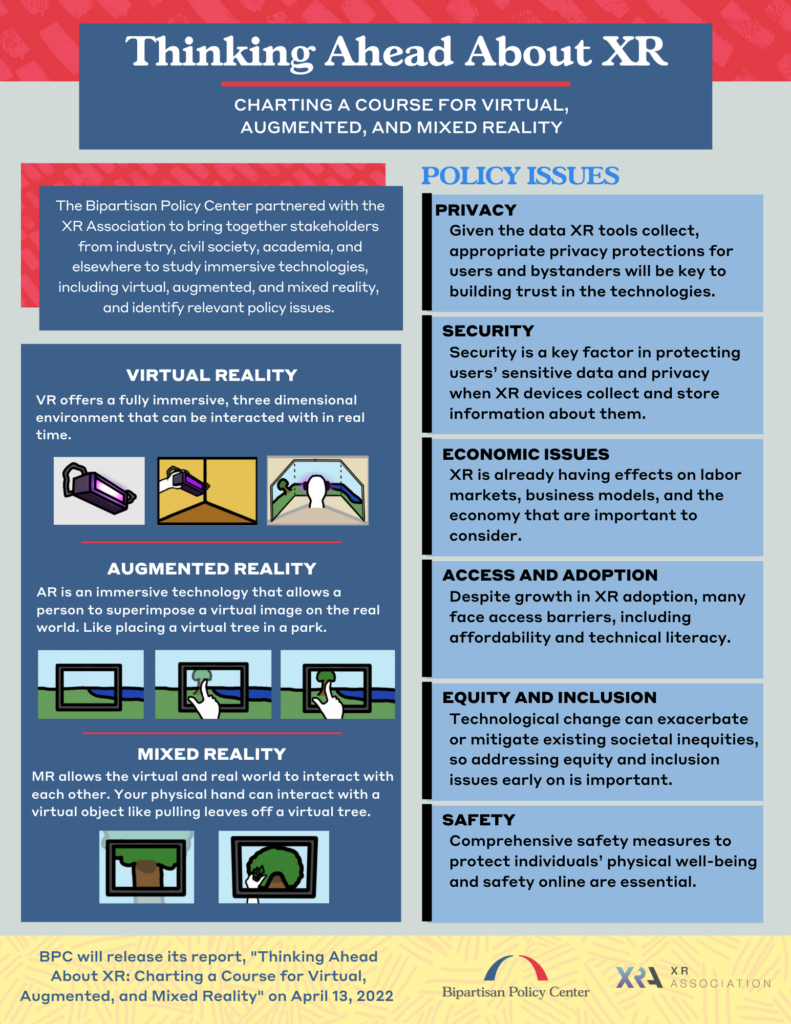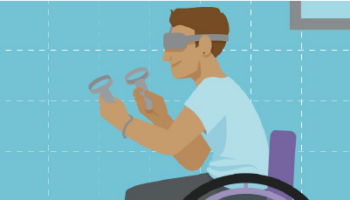Charting a Course for Virtual, Augmented, and Mixed Reality
Washington, DC — The Bipartisan Policy Center (BPC) in partnership with the XR Association has released its report, “Thinking Ahead About XR: Charting a Course for Virtual, Augmented and Mixed Reality”, summarizing key findings on public policy for immersive technologies.
The report, drafted by BPC, is the culmination of a year-long partnership between XRA and BPC that fostered an independent and open process. It synthesizes the sentiments of stakeholders and experts from civil society, industry and academia who participated in public and private convenings focused on XR technologies — virtual reality (VR), augmented reality (AR) and mixed reality (MR). The report provides guidance on important XR policy challenges society should address to optimize the technology’s benefits and minimize its harms.
“As we move towards the successful adoption of XR, it’s critical that we hear from experts representing multidisciplinary backgrounds,” said Liz Hyman, the CEO of XRA. “There is much potential for XR to improve our quality of life, and it’s vital that we’re fostering conversations about its future impact with multiple communities. We’re champions of collecting diverse perspectives.”
During the convenings, stakeholders recommended potential solutions to policy issues that will affect immersive technology, including privacy, security, economic issues, access and adoption, inclusion and safety. The report summarizes these conversations, while providing context on the current policy landscape.
“XR technology is increasingly common, and we will soon see an inflection point that all emerging tech goes through where the application of the tech needs policy guidance” said Tom Romanoff, director of BPC’s Technology Project. “Today’s proactive discussion is necessary to address the challenges of tomorrow by identifying and addressing the shortcomings while still improving quality of life and creating economic opportunity.”
“Public policy plays a key role in shaping the development and use of XR technologies,” said Joan O’Hara, XRA’s VP of Public Policy. O’Hara was integral in the BPC and XRA collaboration for this research. “As an industry, we must continue having conversations to educate the public and members of Congress, in particular. The report does an admirable job of explaining the technology, outlining many positive use cases, and framing some of the public policy debates that must be addressed”

ABOUT THE XR ASSOCIATION
The XR Association promotes the dynamic global growth of the XR industry, which includes virtual reality, augmented reality, mixed-reality, and future immersive technology. XRA is leading the way for the responsible development and adoption of XR by convening stakeholders, developing best practices and research, and advocating on behalf of our members and the greater XR industry.
The XR Association represents the broad ecosystem of the XR industry including headset manufacturers, technology platforms, component and peripheral companies, internet infrastructure companies, enterprise solution providers, and corporate end-users. The founders of XRA are Google, HTC Vive, Microsoft, Oculus from Facebook, and Sony Interactive Entertainment. To learn more about XRA membership, visit xra.org/joinus.
CONTACT:
Bradford Williamson
bwilliamson@glenechogroup.com
(202) 870.3234





